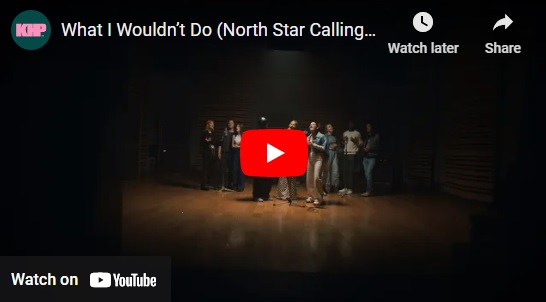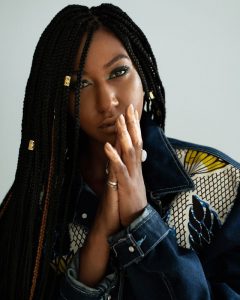Mental health, once a private conversation, is no longer only talked about behind closed doors. Those messy, unexplainable feelings are now more common, especially among youth. Statistics show that in any given year, one in five Canadians experiences a mental illness. Post-pandemic, according to Katherine Hay, President and CEO of Kids Help Phone, that number is closer to one in one.
“When COVID-19 hit three years ago, we were ready to scale and meet this increased demand,” she explains. “Since 2020, young people have connected with Kids Help Phone more than 14 million times.”
On March 2, 2023, to amplify those connections, the national charity launched its latest campaign, Feel Out Loud – the largest youth mental health movement in Canadian history – with the anthem “What I Wouldn’t Do (North Star Calling).” Produced by Grammy nominee Bob Ezrin, Randy Lennox, and Carrie Mudd, Artists for Feel Out Loud features more than 50 Canadian musicians. SOCAN members from a variety of genres lent their voices and volunteered their time, including Serena Ryder, LOONY, Boslen, Johnny Orlando, TOBi, Roy Woods, JESSIA, JP Saxe and many more.

Click on the image to play the Artists for Feel Out Loud video ““What I Wouldn’t Do (North Star Calling)”
And, as befits a truly national charity, the Francophone counterpart of Kids Help Phone – Jeunesse, J’écoute – was equally involved in the initiative, Libère tes émotions. Among the Francophone SOCAN members who joined in to sing on the charity anthem were 2Frères, Dominique Fils-Aimé, Jeanick Fournier, Jonathan Roy, Marie-Mai, Naya Ali, Preston Pablo, Rêve, and Zach Zoya.
The charity song combines the melody of Ryder’s hit “What I Wouldn’t Do” with Leela Gilday’s JUNO-winning “North Star Calling.” In two months, the YouTube video has earned 1.2 million views, and the single has been streamed more than a million times. Kids Help Phone has also seen a 31 percent increase in its service volume.
For more than 30 years, the organization has offered free, 24/7, e-mental health services for youth. The charity set a campaign fundraising goal of $300 million by the end of 2024, to expand its confidential mental health services and reach even more equity-deserving communities. All proceeds generated from “What I Wouldn’t Do (North Star Calling)” will be donated to Kids Help Phone.
“You’re not alone” is the campaign’s main message. Feel Out Loud is about breaking down barriers to mental health services and supports by creating more space for young people to express themselves, feel seen, heard, and have their feelings validated, safe from judgement. It’s no surprise Serena Ryder was involved; the multiple-JUNO-Award-winner’s last record, The Art of Falling Apart, explored her mental health journey, and she frequently talks about her emotional struggles.
“The whole idea of feeling out loud is the most important thing I feel in my life, not just as an artist, but as a human being,” says Ryder. “It was truly amazing to have all of these artists come together, because they’re affected, and because they know what it feels like to have mental and emotional wellness struggles.”

Dominique Fils-Aimé
Dominique Fils-Aimé was happy to participate. “I want to help get rid of the taboos surrounding mental health, that have no reason to still exist,” she says. “Our emotional universes are complex, so imagine how overwhelming that can be for a young person. Having had to struggle with depression as a teenager, I know I was fortunate to have access to support – I can’t imagine what I would’ve done without it.
“Young people swiftly realize the absurdity of the world we leave them. I believe it’s our duty to make sure organizations like Kids Help Phone are there to validate their emotions and support their mental evolution. By giving them those crucial tools at a younger age, we make sure they have even better odds of becoming fulfilled, mentally healthy adults equipped for the rollercoaster ride that is life.”
Growing up in Scarborough, ON., Canadian R&B artist LOONY (aka Kira Huszar) recalls watching after-school TV and seeing Kids Help Phone commercials. She never reached out, or used any of their resources, but one of her friends called a couple of times and had a good experience; she knew that Kids Help Phone was always a resource she had “in my back pocket.” Though she never picked up the phone as a teenager, when the ask arrived to participate in Artists for Feel Out Loud, she said yes immediately.
“I am a super-anxious person and have ADD [attention deficit disorder],” admits the 2020 SOCAN Songwriting Prize nominee, during a break from recording her next project. “Like everyone, I’ve been through situations and traumatic events. I’m usually pretty insular in the way I work. I don’t do a lot of collaborations or features and I’ve never been in a commercial, but I figured if there was ever something to be a part of, this was it.”
When it comes to her mental health, what helps LOONY is to be aware of the signposts and the triggers that affect her mood. “For me, that means to get outside, remember to eat food that nourishes me and just notice the things that make me feel good and do more of that,” she says.
For Vancouver-based alternative hip-hop artist Boslen, music is the eternal saviour that always helps him heal, and keep the darkness at bay. The 23-year-old spent his formative years in rural Chilliwack, B.C., hunting with his dad and “chasing bees and lizards.” When his parents divorced, he was only 12 years old, and didn’t know how to express his feelings. Clarity came when he first heard the song “Up Up & Away.”
“Kid Cudi and that song saved my life!” says Boslen. “He was the first artist to ever say his dad wasn’t around. As a kid, you don’t know why you’re feeling depressed when you are just hanging out at the playground… You don’t know why you have anxiety. But when somebody else says it, you’re, like, ‘Oh yeah, that might be a reason!’ As a man, you have to be open to growth, and putting your ego to the side sometimes. Music is the best therapy for that.”
Like LOONY, Boslen jumped at the offer to get involved in the Feel Out Loud campaign. “I love the message behind it, and I’ve always wanted to try something in this world where it’s not just me,” he explains. “As artists, everybody on that song can relate to this fact, we constantly slave ourselves to our own music to make it perfect. I felt like with this song, we were doing something selfless for other people. How can you say no to that?”
Kids Help Phone’s Kathierine Hay is filled with gratitude that no one said no, and she thanks all of the artists, and the corporate partners, that helped make the Feel Out Loud campaign possible. For the senior executive, the following lines in the song’s second verse, sung by 2023 Breakthrough Artist of the Year Preston Pablo, are the most poignant: Life can bе like a river/ That you are floating down /You may not be a swimmer/ But I’ll never let you drown.
“That’s the most common feeling that our frontline staff say kids calling us share,” says Hay. “Our message back to all kids out there is this: We won’t let you drown. We’re here for you.”